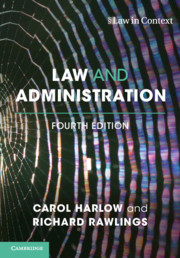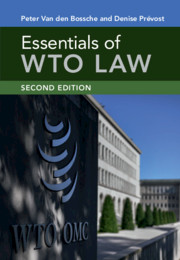Refine search
Actions for selected content:
36807 results in Cambridge Textbooks
26 - Spontaneous Symmetry Breaking in Hadronic Physics
- from Part VI - Spontaneous Symmetry Breaking
-
- Book:
- Introduction to the Standard Model and Beyond
- Published online:
- 12 August 2021
- Print publication:
- 08 July 2021, pp 254-265
-
- Chapter
- Export citation

Law and Administration
-
- Published online:
- 06 July 2021
- Print publication:
- 22 July 2021
-
- Textbook
- Export citation

Psychology Research Methods
- Connecting Research to Students' Lives
-
- Published online:
- 01 July 2021
- Print publication:
- 11 January 2018
-
- Textbook
- Export citation

International Law
-
- Published online:
- 01 July 2021
- Print publication:
- 22 July 2021
-
- Textbook
- Export citation

Essentials of WTO Law
-
- Published online:
- 01 July 2021
- Print publication:
- 24 June 2021
-
- Textbook
- Export citation
2 - Analyzing Sound: Phonetics and Phonology
-
- Book:
- Thinking like a Linguist
- Published online:
- 29 July 2021
- Print publication:
- 01 July 2021, pp 25-94
-
- Chapter
- Export citation
Preface to the Fourth Edition
-
- Book:
- The International Law on Foreign Investment
- Published online:
- 17 June 2021
- Print publication:
- 01 July 2021, pp xix-xx
-
- Chapter
- Export citation
Acknowledgments
-
- Book:
- Thinking like a Linguist
- Published online:
- 29 July 2021
- Print publication:
- 01 July 2021, pp xiii-xiv
-
- Chapter
- Export citation
Part I - Remembrance of Things Past
-
- Book:
- Dinosaurs
- Published online:
- 18 August 2021
- Print publication:
- 01 July 2021, pp 0-5
-
- Chapter
- Export citation
Part IV - Endothermy, Endemism, and Extinction
-
- Book:
- Dinosaurs
- Published online:
- 18 August 2021
- Print publication:
- 01 July 2021, pp 344-347
-
- Chapter
- Export citation
Index of Subjects
-
- Book:
- Dinosaurs
- Published online:
- 18 August 2021
- Print publication:
- 01 July 2021, pp 513-522
-
- Chapter
- Export citation
Bibliography
-
- Book:
- The International Law on Foreign Investment
- Published online:
- 17 June 2021
- Print publication:
- 01 July 2021, pp 615-624
-
- Chapter
- Export citation
Copyright page
-
- Book:
- Thinking like a Linguist
- Published online:
- 29 July 2021
- Print publication:
- 01 July 2021, pp iv-iv
-
- Chapter
- Export citation
4 - Analyzing Meaning: Semantics and Pragmatics
-
- Book:
- Thinking like a Linguist
- Published online:
- 29 July 2021
- Print publication:
- 01 July 2021, pp 150-212
-
- Chapter
- Export citation
11 - Compensation for Nationalisation of Foreign Investments
-
- Book:
- The International Law on Foreign Investment
- Published online:
- 17 June 2021
- Print publication:
- 01 July 2021, pp 525-572
-
- Chapter
- Export citation
1 - Introduction
-
- Book:
- The International Law on Foreign Investment
- Published online:
- 17 June 2021
- Print publication:
- 01 July 2021, pp 1-45
-
- Chapter
- Export citation
Glossary
-
- Book:
- Dinosaurs
- Published online:
- 18 August 2021
- Print publication:
- 01 July 2021, pp 487-506
-
- Chapter
- Export citation
3 - Analyzing Structure: Morphology and Syntax
-
- Book:
- Thinking like a Linguist
- Published online:
- 29 July 2021
- Print publication:
- 01 July 2021, pp 95-149
-
- Chapter
- Export citation
Chapter 4 - Who Are the Dinosaurs?
- from Part I - Remembrance of Things Past
-
- Book:
- Dinosaurs
- Published online:
- 18 August 2021
- Print publication:
- 01 July 2021, pp 64-85
-
- Chapter
- Export citation
Index of Genera
-
- Book:
- Dinosaurs
- Published online:
- 18 August 2021
- Print publication:
- 01 July 2021, pp 523-528
-
- Chapter
- Export citation
